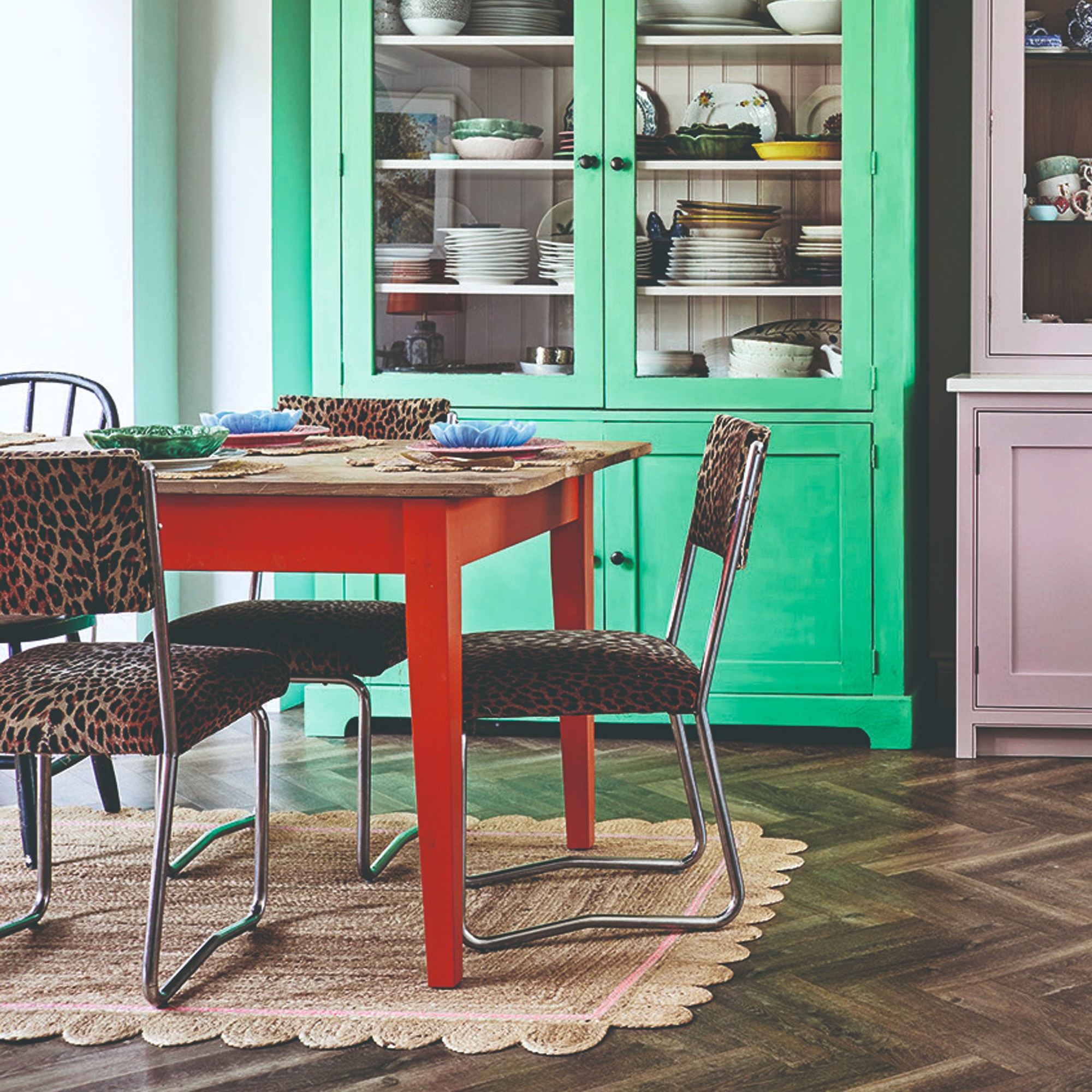
Cosiness is often an aspect we focus on in living rooms and bedrooms, but you're missing a trick if you're not also working on adding this extra boost of comfort into your dining areas, too. One easy way of achieving this is through adding texture, like through dining room rug ideas.
Laying down an area rug underneath your dining table is a widely recommended dining room idea for both aesthetic and practical reasons.
‘Making a rug the focal point of the dining room is a strategic design choice – it lays the foundations for a scheme and subsequently informs the choice of paint, furnishings and furniture for a room,' explains Jodie Hatton, design manager at Brintons.
Daniel Prendergast, director at The Rug Seller, adds the practical benefits. ‘A rug adds comfort and warmth, helps protect the floor, and reduces noise – especially on wood or hard floors. In an open plan home or large dining kitchen, adding a rug is the perfect way to create a defined dining area, making the space feel more organised and intentional.’
So like the experts and even Lily Allen, a rug in your dining pace is well worth it. These are the styles and features to consider when choosing the best dining room rug for your space and needs.
1. Choose a size that’s just right
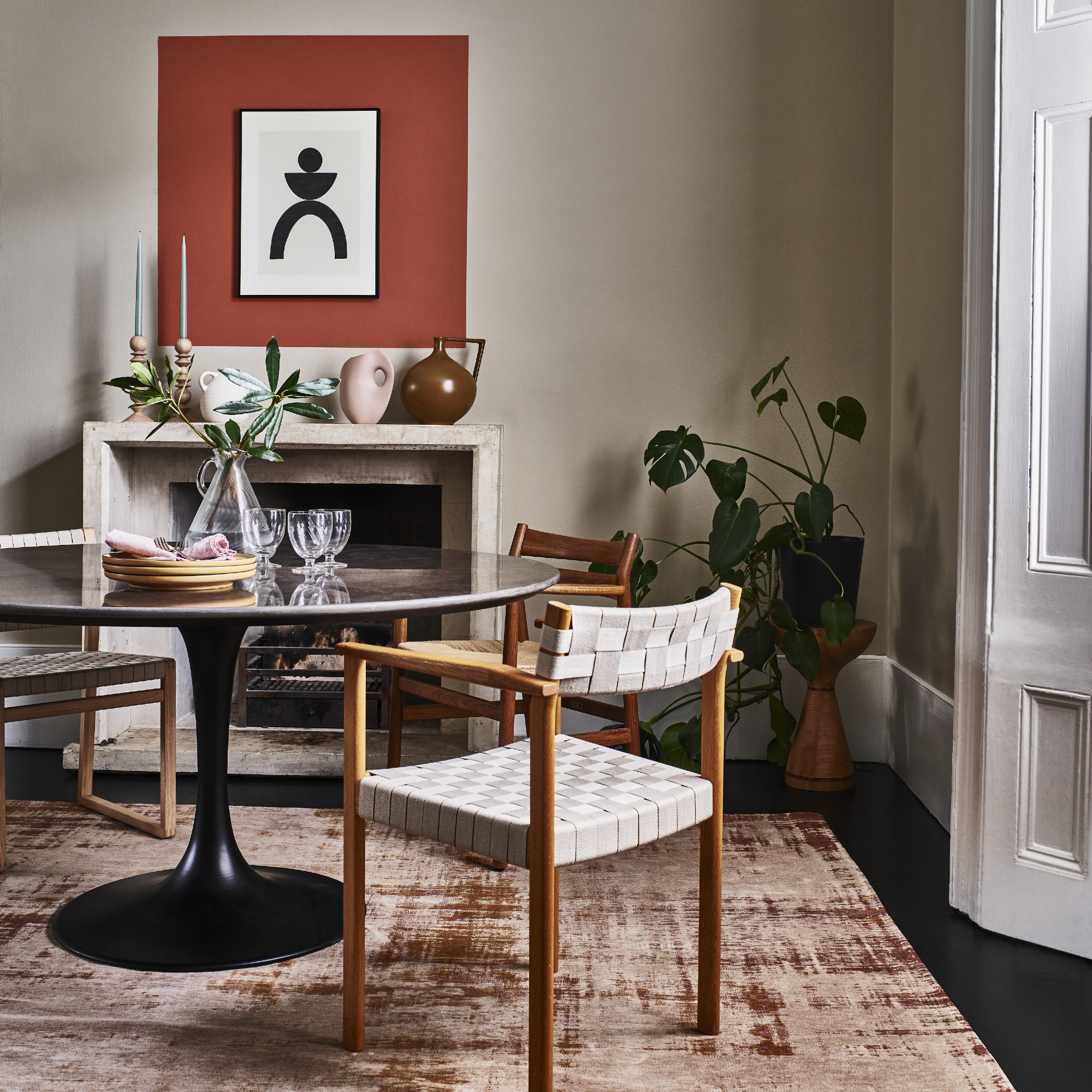
First and foremost you need to know how big your dining room rug ideas should be. While every room is, of course, different, there are a few handy rules of thumb to help you work out the best size for you space. There's the 18-inch rug rule which sets out the ideal rug size to be about 18 inches away from the walls.
Another nifty rule helps to determine the right rug size based on the size of the dining table it will be laid under. ‘Add at least 48-60 inches to both the length and width to work out the optimum rug size,' explains Daniel. 'To give you an idea, if your dining table is 3 feet x 5 feet, your rug should be at least 7 feet x 9 feet to accommodate the chairs comfortably.'
'Make sure that the chairs stay fully on the rug when guests are seated or getting up,' he adds.
2. Mimic the shape of your table
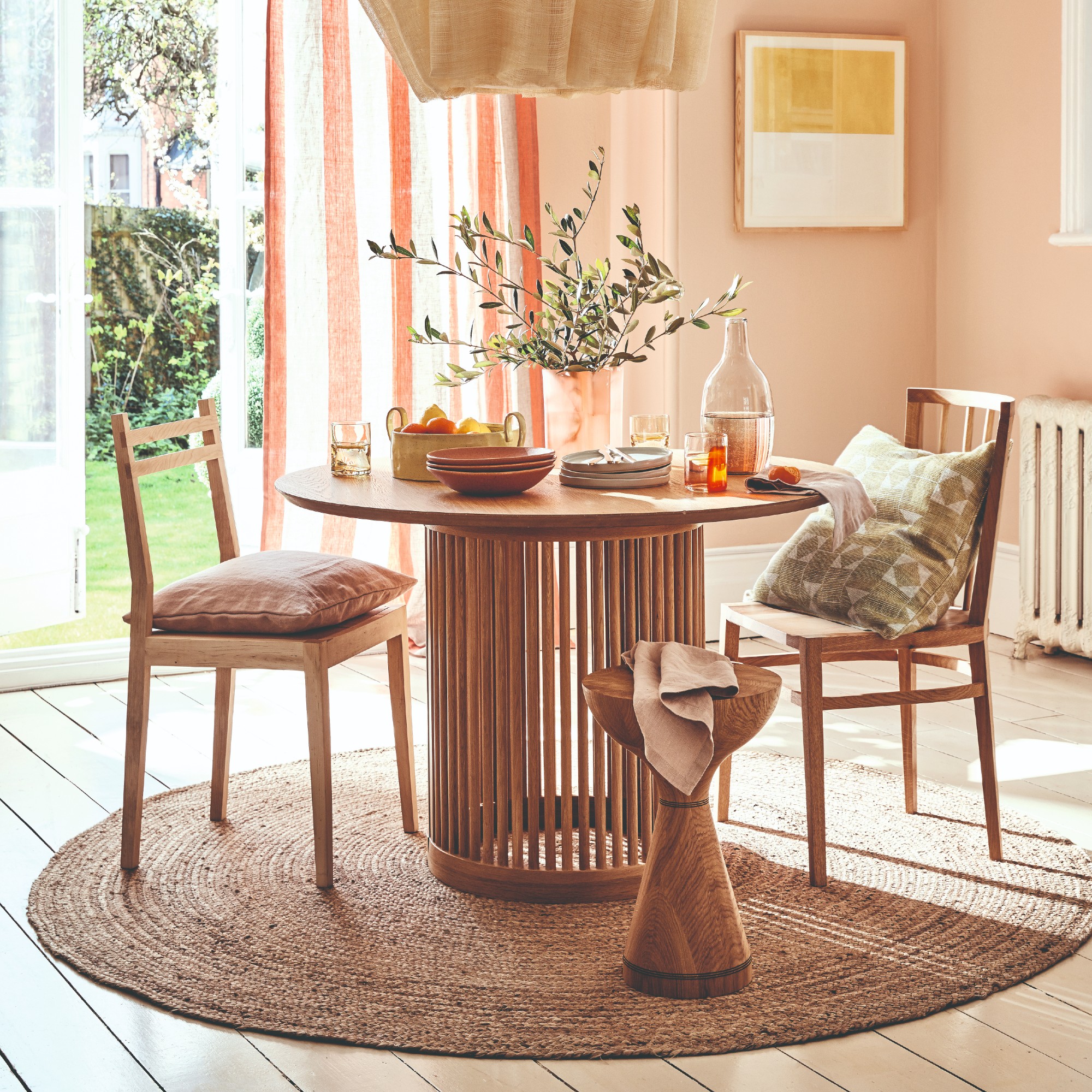
When settling on the style of your dining room rug ideas, always keep in mind the shape of your existing or desired table – as one should ideally mirror the other in order to achieve a balanced look.
The pairing of a dining table and rug will create a cohesive focal point to draw the eye and make the space look well thought-out and considered.
So if you have a round table, your rug should, too, be round while a more traditional rectangular table should be placed on a (you guessed it) rectangular rug.
3. Opt for a flat-weave style for durability
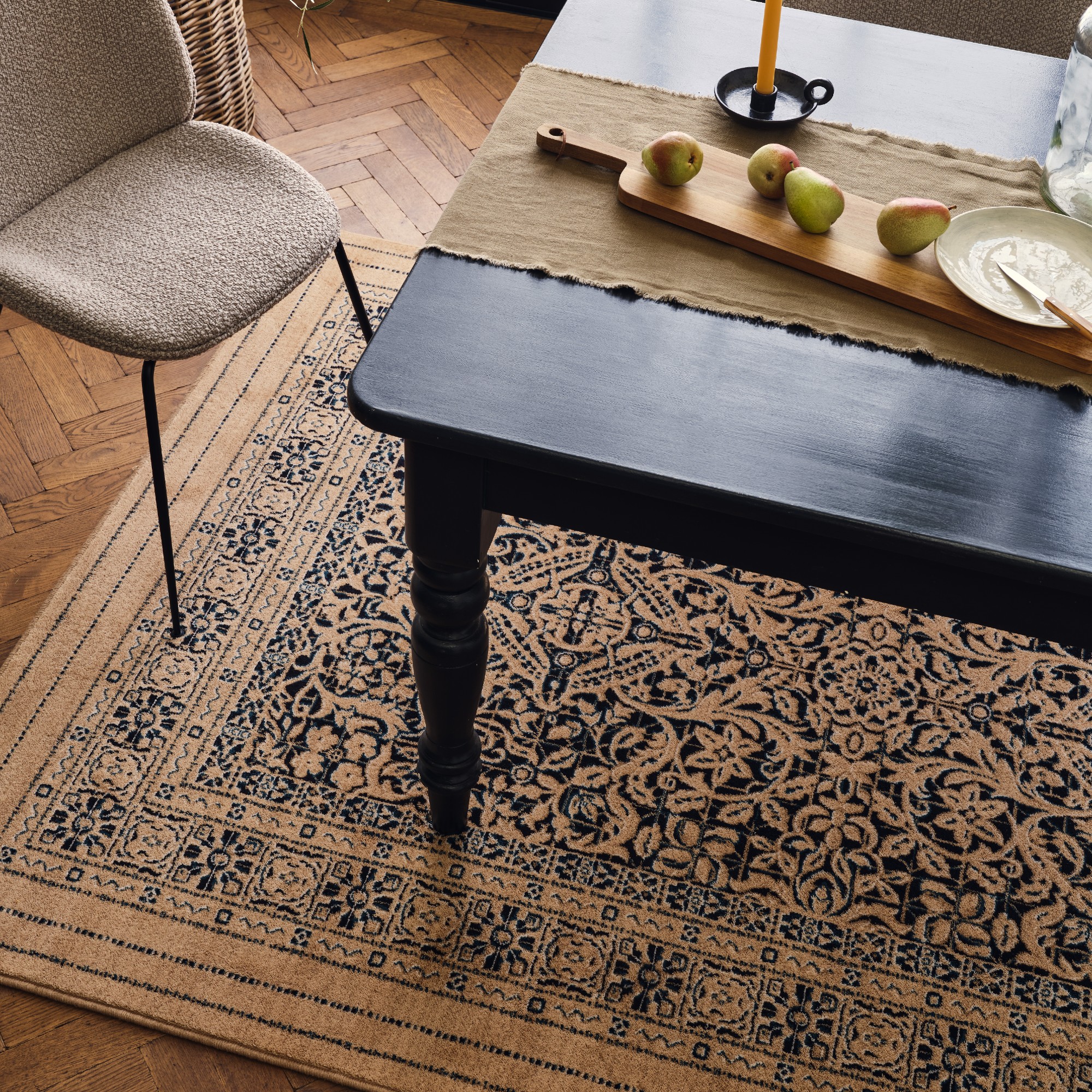
Unless it's strictly a formal space, your dining area is liable to a fair amount of wear and tear between everyday meals and larger gatherings, so selecting a durable weave for your dining room rug is key.
‘To ensure your rug stands the test of time, make sure to choose a practical pile that complements both your dining space and your lifestyle,’ says Kirsty Barton, brand storytelling manager at Alternative Flooring.
‘Low-pile or flat-weave rugs are ideal for dining rooms, effortlessly balancing beauty with durability. These rugs stand up to the wear and tear of chair movement and are easy to maintain, making them a smart choice for high traffic areas.’
‘Flatweave rugs are a great choice,' agrees Liam Cleverdon, flooring trends expert at Flooring King. 'They’re fairly durable and easy to clean, making spillages and stains easy to manage.’
4. Go for a colourful pattern to conceal future spills
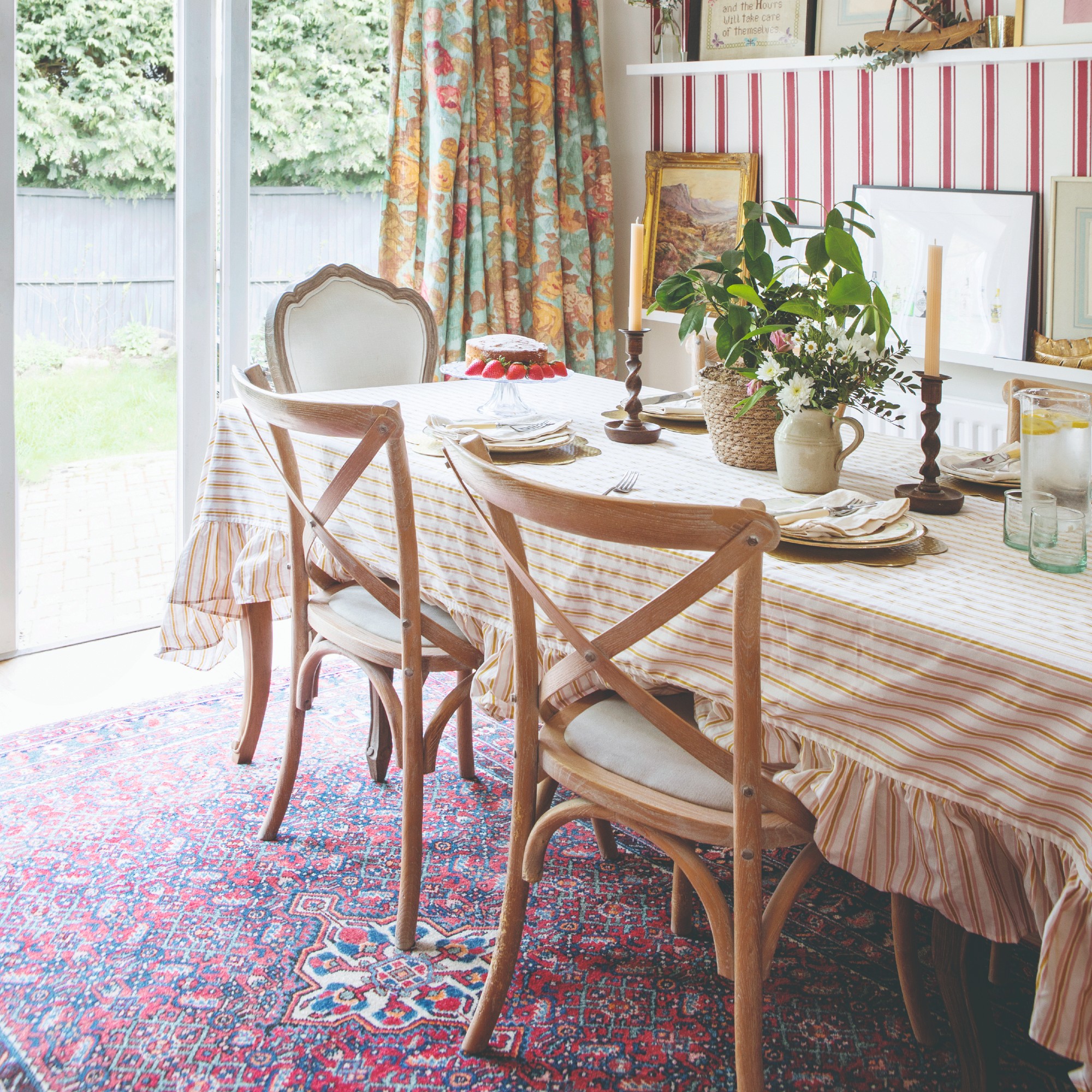
Speaking of spillages, be it from excited guests or just little ones running around, opting for a dining room rug ideas with designs that can conceal hard-to-remove stains is a smart move.
‘For those who host frequently, darker colours and patterns for a rug work well as they can help conceal stains and spills over time,' advises Kirsty from Alternative Flooring. 'They also make the room feel more cosy and intimate, especially when paired with warm, ambient dining room lighting.'
Jodie at Brintons adds that this flooring idea also provides the perfect opportunity to get creative. ‘As the floor is the biggest blank space in a room it provides a fantastic canvas to be creative and can really lift a room and inject personality with a bold accent colour.'
While you can select any colour you wish, Jodie raves about red. 'Red is a dynamic colour that can infuse a room with energy,' she says. 'By introducing red accents, you create a lively atmosphere, encouraging conversation and engagement, making it the perfect choice of colour for social environments such as the dining room. To bring warmth and life to a dining room without overpowering the space, consider adding a rich red rug.’
A floral pattern on a rug is the perfect way to conceal any stains, and if you select a design with a multitude of colours you'll disguise the eye from errant spills even more.
If opting for a red rug as Jodie at Brintons suggests, we'd suggest a vintage-style (or an actual vintage) Moroccan or Persian rug similar to this Ruggable one. But the added benefit of Ruggable rugs is that they're all washable (music to our ears!).
You don't have to go for a floral or Persian pattern to disguise spillages, geometric designs work just as well, especially if you layer in some of those darker shades. So if you have a contemporary space this may be more in your lane.
5. Brighten the room with a light-coloured design
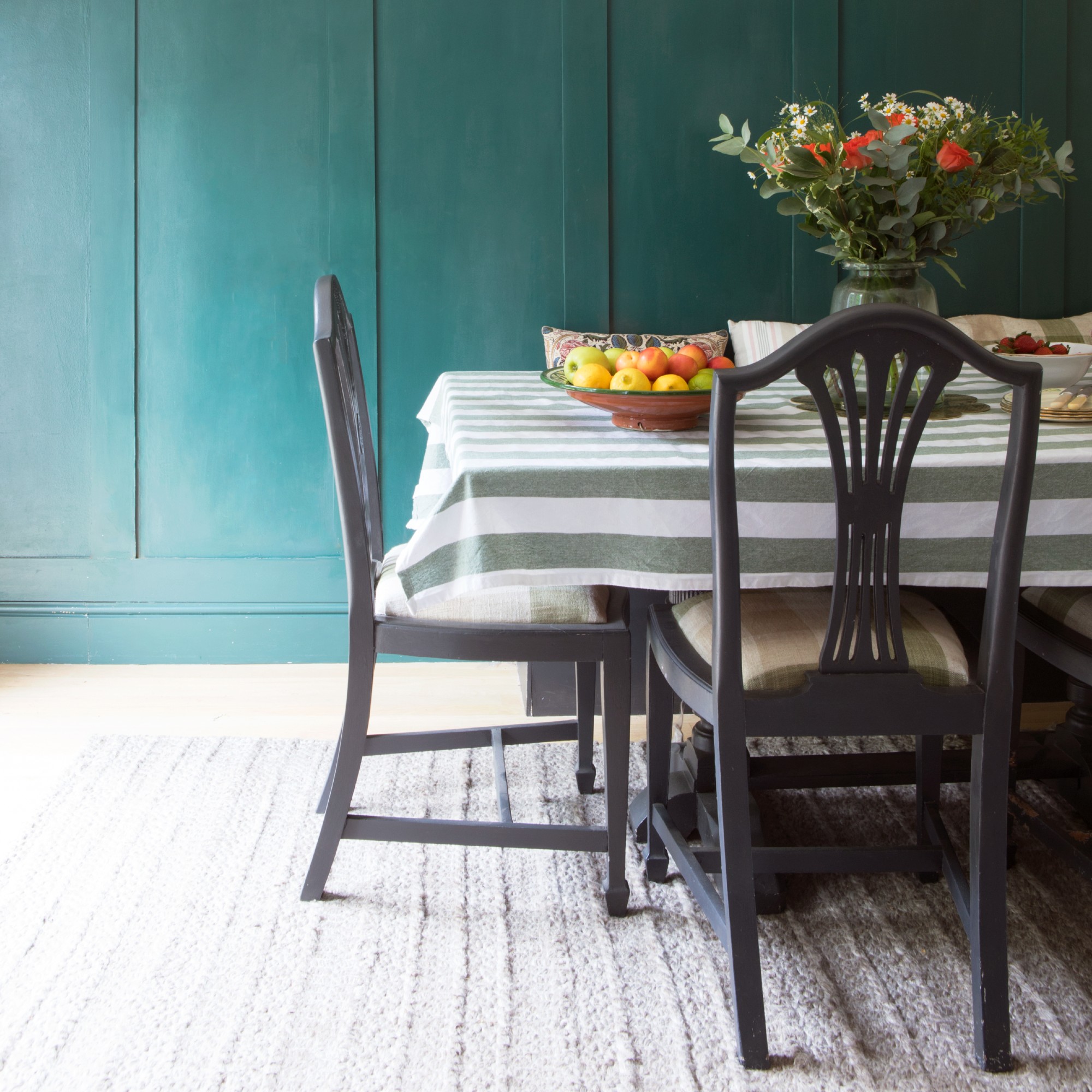
On the other hand, if you’re looking for some small dining room ideas on how to open and brighten up the space, opting for a rug style that is lighter in colour with a pattern that’s not too busy is advised.
‘A lighter rug with a subtle pattern can brighten the room and create the illusion of a larger, more grand space, especially when placed under a statement dining table,’ says Kirsty.
6. Pick hardwearing fibres

When it comes to the ideal rug design for a dining room that’s durable enough for the level of use it’s sure to be put through, it’s not just about the type of the weave used – it’s also about the fibres themselves. Sisal and jute are among the top choices for hardwearing dining room rug ideas.
Sisal is an excellent option, as its natural fibres provide texture while offering a tough, long-lasting surface,' explains Kirsty from Alternative Flooring. 'Jute fibres can also be used in a dining space, adding a softer, more relaxed feel to the area, however, it doesn’t provide the same hardwearing abilities as sisal.'
If opting for sisal, one of the most durable of rug materials, why not let it shine in all its natural glory? This option is made that bit more interesting with a contrasting trim. Simple but effective and super stylish!
If you have a round dining table, then a circular jute rug could beperfect. Also ideal as a bedroom rug idea, we particularly love this one for its woven pattern, making it all the more of an interesting for your dining room.
Jute rugs can be seen by some as a bit boring, but with an on-trend scalloped edge, that couldn't be further from the truth. The contrasting border, available in several different colours, adds a little extra on top.
FAQs
Do you need a rug pad under a dining room table?
Every rug can benefit from a rug pad, especially when it's been placed on hard flooring.
‘I believe a rug pad for a dining room rug is a good idea,' agrees Liam Cleverdon at Flooring King. 'It can prevent the rug from slipping, holding it in place and avoiding shifting when chairs are pulled in and out from under the table. Additionally, it provides extra protection to flooring, preventing scratches and scuffs.'
Daniel Prendergast from The Rug Seller adds, ‘It will also extend the life of your rug, minimising wear and tear from foot traffic, as well as helping reduce noise by providing an extra layer of padding underfoot.’
Should dining chairs sit on a rug?
If you have (or are planning on having) a rug in your dining room, your dining chairs should certainly be able to fit on top of it, both while they’re pushed in and pulled out.
‘Your dining room rug should extend beyond your dining table, allowing extra space for dining chairs to be pulled out, without falling off the edge,’ says Kirsty Barton from Alternative Flooring.
‘Taking this approach ensures for a polished look, preventing the potential risk of chairs tipping over or causing damage to the rug itself due to uneven pressure. Following this guideline is not only practical but it’s a fool proof and simple way to choose the ideal rug size for your dining room.’
We bet you won’t be able to imagine your dining room without a stylish rug as a centrepiece from now on.







